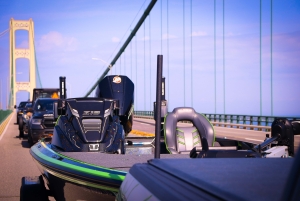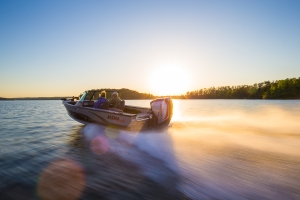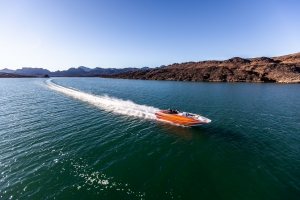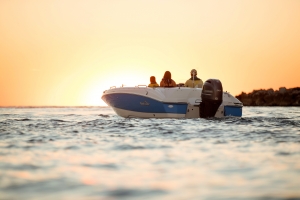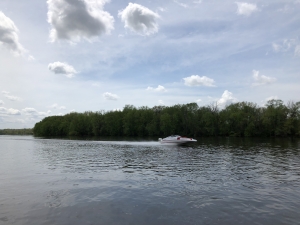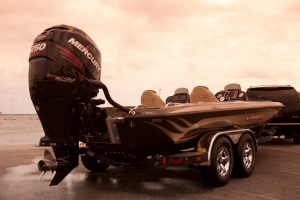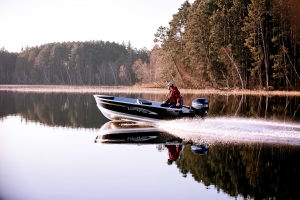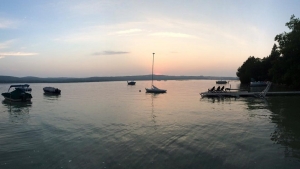Displaying items by tag: Boating
VANS SPORT CENTERS BOATING TIPS: BOAT SEAT PROTECTION
Keeping your boat clean and looking brand new can be a task that constantly needs attention. If you live on a lake and store your boat outside all sumer, you especially know this to be true. Between the sun blistering down all day, birds using it as a perch, rain pounding on it, and the family using it regularly, it can be a tedious battle of upkeep. One of the best things you can do for your boat would have to be protecting and keeping your vinyl seats clean. Once those go, your boat definately takes a hit cosmetically.
LOVE YOUR BOAT? REPOWER WITH NEW TECHNOLOGY!
You've had the boat for a while now and you've finally come to a crossroads. Its time for an upgrade but the real question is what route do you take. Are you looking for a new boat, new-to-me, or are you just looking to repower the old 2-stroke. One of the main things you should be thinking about is how the boat performs for your application of use. Does it do everything you need it to and if not, what would you like different? More often then not, the answer to this question is as simple as repowering the rig.
A GIFT FROM THE FISH GODS
Christmas is right around the corner, but what do you get the person on your list that loves to be on the water? You could go with the traditional new rod and reel set-up, maybe some tackle, or even another pair of expensive sunglasses that they will just end up breaking or loosing in a few months. What if it was something that gives back to the enviroment everytime they're on their favorite waterway?
SPRING TRAINING - GET YOUR BOAT IN SHAPE!
With these warmer temperatures, our eye is on the prize – boating season! And when that first nice day arrives, it’s temping to hit the water immediately, wing it, and hope for the best. However, doing this often leads to breakdowns and a slow joy-ride as you’re being towed back to your launch point. Do yourself a favor and prepare your vessel the right way. It is best to have a certified mechanic complete any pre-seasonal maintenance, but if you’re more of a do-it-yourselfer – no worries. The steps below will provide a few basic (but crucial) things to check before your first launch. Pre-season maintenance will vary depending on different models, sizes, years, etc. Please be sure to check your owner’s manual to complete the manufacturer’s recommended maintenance.
A FEW REASONS TO EXTEND YOUR BOATING SEASON INTO FALL
For many boaters in the northern states, Labor Day weekend marks the last big hurrah of their boating season before it is time to pull the boat out of the water for the winter months. Shortly after the holiday weekend schedules get busy, the kids will be back in school, and that north wind starts blowing cold air from the Arctic. But wait a minute. Just because Labor Day basically marks the end of summer that doesn't mean that your boating season has to come to an end too.
TAKE ADVANTAGE OF MICHIGANS FRESH WATER LAKES AND RIVERS
In Michigan you are never farther than 6 miles from a lake, river, or stream which means if you are a boater or fisherman, you don't have to travel far to find a body of water to enjoy. Our state is fortunate to be surrounded by four of the Great Lakes, thousands of inland lakes, and countless miles of winding rivers and streams that support recreational and fishing opportunities. Basically our state is perfect for activities focused around water and whether your a avid boater or not, you really should take full advantage of our fresh water paradise before summer is over.
SHOW SOME COURTESY AT THE BOAT LAUNCH
With Memorial Day weekend in a few days and the fourth of July not too far behind, I feel that reminding everyone of proper boat ramp etiquette is important. There is no doubt that the launches will be packed with boaters, ranging from the seasoned experts to the noobs or novice first year boaters. For things to run smoothly at crowded boat launches there is a certain set of rules that need to be followed by everyone. If you are an inexperienced boater just learning the ropes, I would recommend giving this article a look to familiarize yourself with the do's and don'ts while launching your boat at a busy public ramp.
BOATING HAZARDS OF INLAND LAKES AND RIVERS
Whether you run the same lake all season long or adventure out to explore new bodies of water, you should always be cautious about seen or unseen hazards wherever you go. Even if you know the lake like the back of your hand and have run the same area year after year without incident, conditions can change and new hazards can emerge that you may not typically have to worry about. Those routes that were normally your safe passage to the other side of the lake can become a danger zone due to variables such as unseasonably low water levels or high water and fast currents. These things can bring on potential threats that can cause major damage to your lower unit or even the hull of your boat.
Fall Boating Perks
Fall is approaching and it will bring the somber end-of-summer vibes with it. Pack away your swimsuit, enjoy your tan while you have it, and kiss the warm weather goodbye - but whatever you do, don't send your boat in for storage just yet. Summer boating is nearly impossible to compete with, but that doesn't mean fall boating should be overlooked completely; it's still good for something.
It's good for your game
With a change in location and bait, fall can be a great time for bass fishing. The colder weather and water temperatures will coax the bass into shallower waters. It's best to use bait that does well in shallower waters: crankbait, spinner bait, or jerkbait to list a few. Because bass are more aggressive in the fall, preparing for cold months with little feeding ahead, they're willing to work for their food - so it will be especially beneficial to use lures that look like the shad that they're feeding on. Regardless of what type of bait you are using, try and mimic the shad with the color.
Fighting Against Ethanol Damage
It's only the beginning of summer and the service department here at Van's Sport Center is already full of boats and motors needing repairs; all fingers are pointed at ethanol. It's pretty clear that ethanol is the boating industry's kryptonite, with it's ability to cause costly damages to a boat engine and steer people away from boating. With some fuels even having a 15% ethanol blend, the risk of using ethanol fuel grows. However, it doesn't mean its time to throw in the towel. Ethanol may be here to stay, but there are still ways to avoid it's negative effects and protect your motor. Here are a couple things that will help you stay on the water and out of the shop:
Recreational fuel is your friend
Most of the time fuel offered at a gas station is ethanol based fuel with at least 10% ethanol blend, which can be harmful. Some places may even be using 15% blend. Ethanol is alcohol and it pulls moisture from the air, which means ethanol-based fuel can cause a variety of damages. For example, ethanol can cause your fuel line hose to fall apart and almost become mushy, causing your fuel line to plug. This is just one area of your motor that ethanol can damage. The breakdown of parts such as the fuel hose, creates residue which can cause goop or build up in other parts of the engine, leading to other problems. One way to prevent these damages and avoid needing repairs--use recreational, non-ethanol fuel. Many places offer a non-ethanol fuel, which can cost a little more but because it is better for an engine it could save you from an expensive trip to the shop in the future.
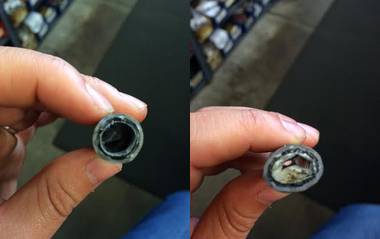
The left side shows a fuel line hose with no ethanol damage, while the right side shows a hose that is almost clogged from ethanol breaking it apart.
Treatments: additives and stabilizers
Although non ethanol fuel is ideal, there are treatments that can make using ethanol fuel not as risky. There are a wide variety of treatments you can use to prevent ethanol damage to your motor and they all help maintain a healthy engine. Ethanol can damage your motor when it separates from fuel because of the water that it absorbs, but these treatments help stabilize your fuel to help prevent damage. They are meant to provide protection during off-season storage but also during operational use; periods of storage often require a higher concentration of the treatment.
BRP has a treatment called 2+4 which is proven to be very effective and recommended to be used at every fill up for maximum year-round protection. Mercury has a 3 step treatment which includes their Quickare, Quickleen, and Quickstor. While Quickare and Quickleen are used to protect during the season, Quickstor is made to be used before storage and provide protection throughout the off-season. Amongst these, there are many other treatments available: such as, Seafoam engine treatment, Yamalube, Starbright fuel additive, and Sta-Bil fuel treatment and stabilizer.

There are a lot of different treatments and they're all aimed to protect your engine.
Fuel tank levels matter
Whether or not a full fuel tank is more vulnerable or safe is a question that is still in debate. While some say that a full tank allows less room for moisture to collect, others say that a full tank has more ethanol which will pull in more moisture than an empty tank with small amounts of ethanol. 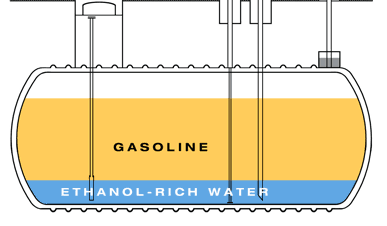 Because it is hard to determine which one is better, a good solution is to determine a safe level for your fuel tank depending on the amount of expected future use. If you have a boat that is used often, maintaining a full tank would be advantageous. Cars are not at as big of a risk for ethanol damage because of their frequent use, so when a boat is used frequently a full tank does not increase the risk of damage. However, when you have a boat that is not used quite as frequently or being stored, running through the fuel completely will help eliminate risk of damage.
Because it is hard to determine which one is better, a good solution is to determine a safe level for your fuel tank depending on the amount of expected future use. If you have a boat that is used often, maintaining a full tank would be advantageous. Cars are not at as big of a risk for ethanol damage because of their frequent use, so when a boat is used frequently a full tank does not increase the risk of damage. However, when you have a boat that is not used quite as frequently or being stored, running through the fuel completely will help eliminate risk of damage.
While ethanol certainly poses a threat to outboards, there are things to do to that can help you avoid this or lower the intensity of the damages. Using the right fuel, treating your fuel and paying attention to the level of your gas tank are small tasks that can offer a big pay off. Don't hesitate to contact Van's Sports Center with any questions or boating needs!



